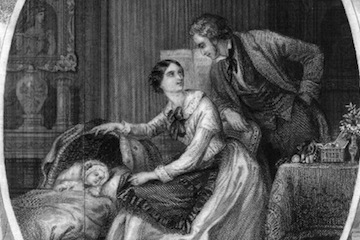What was Coverture? Understanding the Rights of Women in Early America
One important term of early American history is coverture. This was a principle of English common law in which a married woman could not own property, sign contracts, control the use of any wages earned, or devise a will. Indeed, a married woman became known as a "feme covert" (covered woman), and even in the case of rape or domestic violence there was little legal recourse for a women to pursue against her husband.
Two historical terms have been used to describe the culture for women through the mid-1800s which found its legal expression in coverture. They are Republican Motherhood and the Cult of Domesticity. Republican Motherhood refers to the idea that women were conveyors of the republican values of the Revolution. It was as mothers and teachers that women would educate the future generations, and this education was expected to instill a respect for the American constitution and system of life and government. The Cult of Domesticity was more directly concerned with women's domestic behavior. Women were expected to defer to male authority, to remain virtuous in religious belief and sexuality, to forego participation in public affairs, and focus solely on the uplift of the family.
Alexis de Tocqueville was one who took notice of the situation. With the perspective of an educated outsider, he spoke to coverture (indirectly) in his book Democracy in America, which was published in 1835. De Tocqueville wrote, "In no country has such constant care been taken as in America to trace two clearly distinct lines of action for the two sexes, and to make them keep pace one with the other, but in two pathways which are always different. American women never manage the outward concerns of the family, or conduct a business, or take a part in political life; nor are they, on the other hand, ever compelled to perform the rough labor of the fields, or to make any of those laborious exertions which demand the exertion of physical strength. No families are so poor as to form an exception to this rule."
In practice, there were good men and other men, and the same for women. If a man failed to provide for his family, if he was a drunk or acted indecently, or abandoned his wife, then the entire logic of the system collapsed. In other cases, if a married man was susceptible to moral reasoning and the pangs of conscience, a woman's position was not much different from that of a woman in any era, in a loving marriage, who does not work outside of the home. And certainly a woman had her own obligations to the household under this mentality which were expected to be fulfilled.
Even before turning their sights on women's suffrage, women's rights advocates of both genders challenged the doctrine of coverture. Change came on a state-by-state basis, reflecting the United States's federalist legal structure. Collectively, the actions of the states to grant married women their just property rights are known as Married Women's Property Acts. They were largely passed from 1850 onward, with a few states holding out until almost 1900. The legacy of coverture survived well past the 19th century. For instance, it was long difficult for a married woman to conduct business or financial transactions without the signature or presence of her husband.
